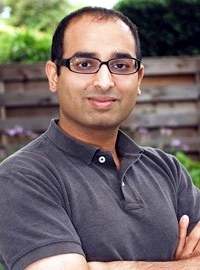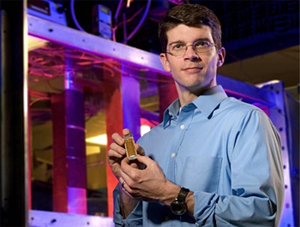
Two rising stars on the faculty of the Florida A&M University-Florida State University College of Engineering are recipients of highly competitive research grants offered by the National Science Foundation.
Anant K. Paravastu, an assistant professor of chemical and biomedical engineering, has won a five-year NSF Faculty Early Career Development Award, also known as a CAREER Award, totaling $404,992 to advance his research into “designer” proteins, an area of study that could contribute to breakthroughs in the emerging fields of regenerative medicine and nanotechnology.
William S. Oates, an assistant professor of mechanical engineering, has received the same award in the amount of $400,000 over five years. Oates’ grant will enable him to continue his work with photoelastomers — materials that change shape in response to light. Knowledge gained from his research could one day lead to the development of highly adaptable “smart” structures with applications in robotics, medicine and energy harvesting, among other areas.
NSF CAREER Awards are designated for scientists who are still in the early stages of their academic careers and are intended to help them build upon previous accomplishments in their areas of research.
“These awards not only speak to the excellence of the proposed research of Professors Oates and Paravastu but also to the new ideas presented in the education portion of their grants,” said FSU Vice President for Research Kirby Kemper. “Our current students as well as future generations will benefit from the new areas of materials study that they are developing, both in the classroom and laboratory.”

Paravastu’s project, titled “Solid State NMR Characterization Of Molecular Structure And Self-Assembly Of Protein Nanofiber Matrices,” involves evaluating at the molecular level the self-assembly and self-healing processes, among other properties, of certain protein structures. The knowledge gained from his research could help lead to the development of a biologically inspired, “bottom-up” approach to nanomaterial construction with applications in regenerative medicine and nanotechnology.
“Recently, scientists have used insights gained from decades of studying the structural biology of naturally occurring proteins to engineer ‘designer’ proteins capable of forming nanofiber matrices, or tissue scaffolds,” Paravastu said. “These scaffolds show great promise in regenerative medicine; for example, recent reports indicate that they have the ability to support the healing of damaged neurons or the encapsulation of transplanted stem cells.
“Particularly interesting properties of these proteins include their ability to adapt their structures to environmental stimuli and regenerate their nanostructures following damage,” he added. “Through the full characterization of molecular structures and formation pathways for designer-protein tissue scaffolds, we seek to achieve unprecedented control of the biological, physical and chemical properties.”
In conducting his research, Paravastu employs an incredibly powerful analytical technique known as solid-state nuclear magnetic resonance (NMR) spectroscopy using tools located at the National High Magnetic Field Laboratory. With this technique, he utilizes high magnetic fields to measure the strengths, directions and temporary fluctuations of magnetic interactions between the atoms within a protein.)
In addition, the educational requirements of Paravastu’s award include integrating his research findings into coursework for a wide range of student age groups, as well as creating new opportunities for undergraduate and graduate-level research. He will also work to stimulate enthusiasm for science and technology among children, families and middle- through high-school students, particularly those from groups that are historically underrepresented in the science field.
Paravastu began his academic career at Florida State in 2008 after earning a doctorate in chemical engineering from the University of California, Berkeley and a bachelor’s degree from the Massachusetts Institute of Technology. He has also completed graduate work at Lawrence Livermore National Laboratory in Livermore, Calif., and postdoctoral research at the National Institute of Diabetes & Kidney Diseases in Bethesda, Md. Yet despite all of his success, Paravastu remains modest about his CAREER Award.
“As much as I love my work, I am well aware that there is a great deal of excellent science being done by young professors in the United States,” he said. “The message I get from this success is that I benefited from strong support from FSU and effectively justified my project in terms that are consistent with the NSF review process. I am humbled by this honor and look forward to delivering on my promises.”
Oates’ CAREER Award, meanwhile, is for a project titled “Materials Driven by Light: Nonlinear Photomechanics of Liquid Crystal Elastomers.” In it, he will explore how light interacts with a specific type of material known as a liquid crystal polymer to create mechanical devices fueled directly by light that can change their shape without the need for complex gears and linkages. Such polymers could aid in the development of novel actuators for drug delivery, robotics and adaptive optics.
“My objective is to quantify how liquid crystals can control the shape of polymers when they are exposed to light,” Oates said. “A greater understanding of the mechanics of these polymer networks is expected to have broad implications on the development of mechanical devices driven directly by light, including robotic manipulators, microfluidics, drug-delivery devices, energy harvesting, and adaptive optical devices.”
In addition, the educational objectives of Oates’ award will include integrating research into the curriculum by creating a remote, Web-based active materials laboratory and a new course, a new active materials Research Experience for Teachers program, and a K-12 program at the Mary Brogan Museum of Art and Science in Tallahassee. The museum program will include a hands-on exhibit of a smart-structure, wind-tunnel model.
After receiving bachelor’s, master’s and doctoral degrees from the Georgia Institute of Technology — the latter in 2004 — Oates has been a member of the FAMU-FSU College of Engineering faculty since 2006. In 2009, he won another national honor for his research on smart materials when he was selected by the Defense Advanced Research Projects Agency (DARPA) as one of 33 rising stars at 24 U.S. universities to participate in the agency’s Young Faculty Award program for that year. However, like Paravastu, he is humble about this latest honor.
“It’s an honor and privilege to receive the NSF CAREER Award,” Oates said. “This would not have happened without a lot of support from several students and research collaborators.”




